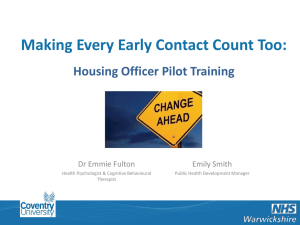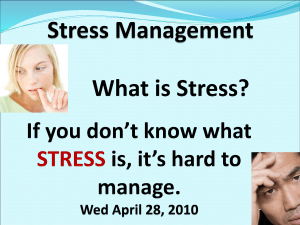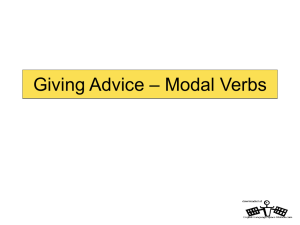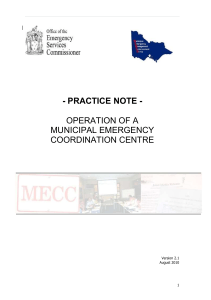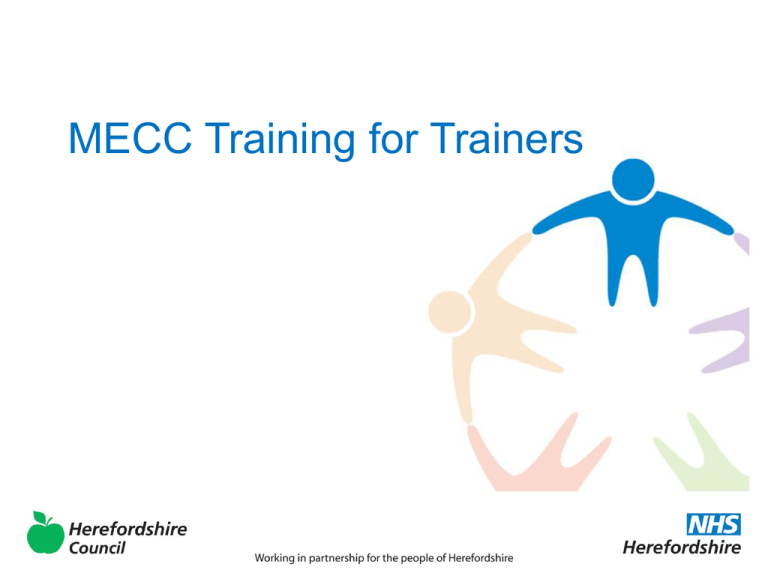
MECC Training for Trainers
What are we going to cover?
1.What MECC is and isn’t, why it is
important to your work and what
kind of impact we could have
2. Putting MECC into Practice:
a) What is MECC to your Team
b) Tips to Ask, Advise and
Assist
c) Opportunity to practice
3. Review Barriers to MECC
By the end of the session
• Appreciate the importance and potential impact
of raising lifestyle issues in your work
• Increase knowledge of what factors can impact
on peoples’ ability to make lifestyle changes
• Develop skills for putting MECC into practice:
-Plan for how and when to raise lifestyle issues
-Increase knowledge of key messages in
relation to lifestyle areas and tips for effective
advice
-Increase understanding of where to signpost
-Practice raising and responding to lifestyle
issues
Section 1
MECC Review
WHAT IS MECC?
What MECC IS
What MECC Is NOT
MECC means making the best
of every appropriate opportunity
to raise the issue of healthy lifestyle
Asking individuals about their
lifestyle and changes they may wish
to make (Ask)
Responding appropriately to the
lifestyle issue/s once raised (Advise)
Taking the appropriate action to
either give information, signpost or
refer service users to the support
they need. (Assist)
It is not about adding another
job to your already busy working
day
It is not about you becoming a
counsellor or providing ongoing
support to particular individuals
It is not about you becoming a
specialist in a certain lifestyle
area
It is not about you telling
somebody what to do and how to
live their life
It IS about you helping people to know how they can
improve their own health and wellbeing
Why is it important to raise lifestyle issues?
MECC is particularly important for people with mental health
issues or learning disability because:
1. Data suggest that they may see worse physical
health outcomes than the general population, for
example:
• People with depressive disorders are about twice
as likely to develop coronary artery disease, twice
as likely to have a stroke and four times as likely to
have a myocardial infarction as people who are not
depressed.
• People with schizophrenia are more likely to get
common cancers (breast and bowel) and to be
diagnosed with coronary heart disease or have a
stroke under age 55
Why is it important to raise lifestyle issues?
MECC is particularly important for people with mental health
issues or learning disability because:
2. It can be difficult for people with mental illness or
learning disability to access primary care services
without prompting
3. Improvements in lifestyle behaviours can positively
impact on mental health and wellbeing for example:
• Alcohol is a depressant drug
• Smoking (nicotine withdrawal) increases stress
levels
What Impact Can MECC Have?
• In the past day, how many contacts
have you had where you could have
raised lifestyle issues?
• Every day staff have millions of contacts
with people that could be used to offer
appropriate information on staying healthy
• Over 288,000 staff in NHS Midlands & East. Very
brief advice given 10 times a year by every member
of staff = 2.88 million opportunities to change lifestyle
behaviour
• Less than an hours time a year per person
Barriers to Implementing MECC
We all want to help
improve peoples’
health:
•What barriers might
stand in the way of
us making contacts
count?
Section 2
Putting MECC Into Practice:
MECC in Your Team/Department
-What does MECC
look like for your
team/department?
-What lifestyle areas
do you see the
most and where
can you have
the most impact?
mental
wellbeing
healthy
eating
physical
activity
smoking
alcohol
mental
wellbeing
smoking
healthy eating
alcohol
physical
activity
MECC and Health Inequalities
• Health is affected by a number factors i.e. wider
determinants of health:
• Examples: Factors we are born with – ethnicity, gender,
age; Social and community factors – relationships with
family and peers; Socioeconomic and environmental
factors – un/employment, income, education, housing,
literacy, geography, transportation, access to health services
• Health inequalities are differences in health status or
in the distribution of health determinants between
different population groups. (WHO)
• Example: People from deprived socio-economic areas within
Herefordshire not only have considerably shorter lives
compared to people from more affluent areas, but they also
spend many more of their later years living with a chronic
disease or disability
MECC and Health Inequalities
What does this mean for how
you will implement MECC?
-How might the wider determinants of health
contribute to peoples’ current lifestyle behaviours
and make it difficult for them to change?
-How might this impact on how you will deliver BOA?
Overview of the Process
Implementing MECC: Ask
How to raise lifestyle issues?
What to say and how to say it
Implementing MECC: Ask
When to raise lifestyle issues?
-What are the points of contact with
people which provide opportunities to
promote healthy lifestyles?
-Are some points in the intervention
pathway likely to be more effective than
others to engage the person?
receptionist
initial assessment
consultation
treatment
receptionist
Implementing MECC: Ask
Dealing with resistance
What if the person…….
doesn’t want to talk?
is defensive?
is not fluent in English?
is tearful?
is in a hurry?
is not telling you the truth?
Implementing MECC: Advise
Tips for giving advice
I’ve been told to
move around more,
lose weight, quit
smoking and
eat the carrot!
Implementing MECC: Advise
Look interested
Involve yourself by
responding
Stay focussed on
information giving
Test your understanding
Evaluate what is not being
said
Neutralise your feelings.
Implementing MECC: Advise
Self Efficacy
•A person’s belief or confidence in
his/her ability to succeed in a particular
situation or achieve a desired outcome
•Helping people believe that they can be
successful at changing their behaviour
and achieving their goals can move
them towards making a change
•To build self efficacy, you can provide
words of encouragement and support,
for example:
“I really think you are capable of succeeding”
“It sounds like when you’ve made up your mind you can get
on and do things”
“You have the power to change yourself”
Implementing MECC: Advise
Key Messages
by Lifestyle Area
Implementing MECC: Advise: Smoking
Quitting SMOKING
Implementing MECC: Advise: Smoking
Why Quit?
• Quitting smoking is the single most powerful way
of improving your health and living longer
• You will reduce the chances of your children getting
bronchitis, pneumonia, asthma attacks, meningitis
and ear infections.
• You will save money – around £250 a month for a
typical 20 a day smoker.
• You will improve your breathing and general fitness.
• You will no longer smell of stale tobacco and your
skin and teeth will look better.
Implementing MECC: Advise: Smoking
Suggestions you can make:
• Offer support:
• People are 4 times more likely to quit with support
• With a stop smoking adviser you get free advice,
support and encouragement to help you stop smoking
for good.
• Stop smoking providers are at GP surgeries, Halo
Leisure centres and most pharmacies
• Try nicotine replacement products or medication – range
of products available
• Avoid situations you associate with smoking
• Gain support from friends and family
• Set a date for stopping smoking a few weeks in the future.
This gives you a day to aim for and time to prepare
Implementing MECC: Advise: Alcohol
Implementing MECC: Advise: Alcohol
Why Cut Down:
Sleep better
More energy
Lose weight
No hangovers
Improved memory
Better physical shape
Reduced risk of injury
Improved relationships
Reduced risk of high blood
pressure
Reduced risk of cancer
Reduced risk of liver disease
Reduced risk of brain damage
Reduced risk of drink driving
Improved mood
Save money
Implementing MECC: Advise: Alcohol
Suggestions you can make:
•Find out how many units are in your usual drink
•Try for 2 alcohol free days each week
•If you tend to have a drink at a certain time of day, try to
plan other activities and tasks at those times
•Swap your usual drink for a drink with less alcohol content
(ABV)
•Try a smaller drink – a small glass of wine instead
•Make a plan – before you start drinking, set a limit for how
much you’re going to drink
•Only take a fixed amount of money to spend on alcohol
•Have your first drink after starting to eat
•Quench your thirst with non-alcohol drinks before alcohol
and alternate alcohol with water to keep hydrated
Implementing MECC: Advise: Physical Activity
Implementing MECC: Advise: Physical Activity
Why Be Active:
•Regular physical activity can reduce your risk of major
illnesses, such as heart disease, stroke, diabetes and
cancer by up to 50% and lower your risk of early death
by up to 30%. Almost 40% of deaths from coronary heart
disease are down to inactivity
•Physical activity can reduce stress, help you feel
happier and boost your self-esteem, energy levels and
sleep quality.
• It is an excellent way to be with friends, meet new
people, enjoy yourself and have fun!
Implementing MECC: Advise: Physical Activity
Suggestions you can make:
•Build up activity levels slowly and at your own pace
•Pick an activity you like that fits into your life
•Walk or cycle for all or part of your journey (get off the
bus one stop early or park your car a few blocks away)
•Take the stairs instead of the lift or escalator
•Exercise at lunch time; walk or go to a gym
•Take up an active hobby such as cycling or walking
•Get active around the house e.g gardening or DIY
•Split it up – As long as you’re getting your heart rate
up for 10 minutes or more it counts
Implementing MECC: Advise: Physical Activity
Suggestions you can make:
•Build up activity levels slowly and at your own pace
•Pick an activity you like that fits into your life
•Walk or cycle for all or part of your journey (get off the
bus one stop early or park your car a few blocks away)
•Take the stairs instead of the lift or escalator
•Exercise at lunch time; walk or go to a gym
•Take up an active hobby such as cycling or walking
•Get active around the house e.g gardening or DIY
•Split it up – As long as you’re getting your heart rate
up for 10 minutes or more it counts
Implementing MECC: Advise: Healthy Eating and
Weight Management
Implementing MECC: Advise: Healthy Eating/Weight
Management
Why?
Eating the right foods in the right amounts
helps to:
• Maintain a healthy weight
• Reduce blood pressure and cholesterol
levels
• Maintain strong bones and muscles
• Improve resistance to infection
• Keep up energy levels and improve mood
Implementing MECC: Advise: Weight Management
Why?
Losing just 5-10% of your weight (about 5-10kg or 1122lbs) can help you:
• Feel less tired
• Increase your energy levels
• Move about more easily
• Reduce breathlessness
• Reduce back and joint pain
• Lower blood pressure and cholesterol
• Reduce the risk of diabetes and heart disease,
stroke and some cancers
Implementing MECC: Advise: Healthy
Eating/Weight Management
Suggestions you can make:
•Use the eatwell plate to help you get the balance right
•One third of what you eat should be starchy foods like
potatoes, cereal, pasta, rice and bread
•Aim for ‘five a day’ portions of fruit and vegetables. Try to have
some fruit or vegetables with each meal to reach 5 a day –
frozen and tinned count.
•Aim for less fat, sugar and salt. Check food labels for fat,
sugar and salt contents to swap higher levels for lower levels
•Drink plenty of fluids – about 1.2 litres each day (6 to 8
glasses). All non-alcoholic drinks count, but water, milk and
fruit juices are most healthy
•Eat regularly - try to eat 3 meals a day, including breakfast
Implementing MECC: Advise: Healthy
Eating/Weight Management
Suggestions you can make:
• Aim for losing between 5-10% weight to make a big
difference to your health
• Aim for a gradual weight loss of between 1-2lbs or 0.5-1kg a
week
• Check your BMI regularly – (you can use the link to a BMI
calculator in the Healthy Lifestyle booklet)
• Watch your portions – try using a smaller plate, eat slowly
and stop eating as you start to become satisfied
• Plan your meals ahead of time – make a list and stick to
a budget to avoid impulse buys
• For snacks, try a healthy option like fruit, low-fat yogurt
or a drink instead of biscuits, chocolates and crisps
Implementing MECC: Advise: Mental Wellbeing
Implementing MECC: Advise: Mental Wellbeing
Why is it important?
• Our overall wellbeing involves both the body and
the MIND
• Mental wellbeing helps us to:
– Feel good about ourselves and the world around us
– Get the most from our lives
– Achieve the goals we set for ourselves
• Good mental wellbeing is also important for our
physical health
Implementing MECC: Advise: Mental Wellbeing
Suggestions you can make:
5 ways to wellbeing:
•Connect with other people who make you feel good:
friends, family, colleagues, neighbours
•Be active (ideally 30 minutes exercise a day) Take a walk,
go cycling, garden, dance or play a game of football
•Give: Do something for a friend, neighbour or stranger.
Volunteer and give back to the wider community
•Take notice: pay attention to the beauty in life. Smile!
•Keep learning: join a class or learn a new skill,
consider taking up a hobby
Implementing MECC: Advise: Sexual Health
Sexual Health
Implementing MECC: Advise: Sexual Health
Why is it important?
• A healthy sex life is an important part of a
person’s wellbeing. Poor sexual health can
result in:
– Unplanned pregnancy
– Sexually transmitted infections
– Low self esteem, anxiety or depression
– Relationship problems.
Implementing MECC: Advise: Sexual Health
Suggestions you can make
•Use a condom every time you have vaginal, oral or
anal sex
•Learn how to use a condom correctly - you will get
better the more you practice. Practice opening and
using a condom alone and in the dark
•Use contraception to avoid unplanned pregnancy –
there are lots of types, find out which is right for you
•Talk to your partner about sex ahead of time
•Get tested to make sure you are STI free
Implementing MECC: Assist
Signposting to further
information and support
Implementing MECC: Assist
Smoking:
• Stop smoking providers are located at:
• GP Surgeries,
• Halo Leisure Centres and
• Most pharmacies in Herefordshire
• To help someone find out where their nearest
adviser is:
• Signposting Directory under “smoking” –
all providers listed
• http://www.herefordshire.nhs.uk/stopsmoking click on “find out where your nearest adviser is”
Implementing MECC: Assist
Alcohol:
• Staff trained in alcohol
Identification and Brief Advice (IBA)
should continue to offer this as part
of MECC
• If service user needs more
intensive intervention, can direct
them to DASH
• Signposting Directory under
“alcohol” – includes DASH and
sources for further information
Implementing MECC: Assist
Physical Activity:
• Many local opportunities to get
and stay active
• Signposting Directory under
“physical activity” – includes
Walking for Health, Healthy Hearts
Trail, information on cycling in
Herefordshire, sports clubs and
Halo Leisure Centres, national
resources and information
Implementing MECC: Assist
Healthy Eating/Weight
Management:
• Signposting Directory under
“healthy eating/weight
management” – includes
Change 4 Life, NHS choices
sites, BMI calculator,
Weightwise – site just for
young people
Implementing MECC: Assist
Mental Wellbeing:
• Signpost around the 5 ways to
wellbeing: be active, take notice,
keep learning, connect and give
• Signposting Directory under
“mental wellbeing” – includes
signposting for 5 ways to
wellbeing, NHS mental wellbeing,
Living Life to the Full (free online
course) and self help booklets
Implementing MECC: Assist
NHS Health Checks
• Your service users may
have received invites to
a free NHS health check.
• As part of signposting,
you can remind them to
take up this opportunity
• A health check can help
them prevent heart
disease, stroke, type 2
diabetes and kidney
disease
Implementing MECC: Assist
What information gaps are
there if any to support you
in MECC?
Any confusion over what to do
regarding a particular lifestyle issue?
Questions?
Implementing MECC: The Elephant in the Room
We might find it difficult to raise a lifestyle issue
with a client if we…
smoke
drink too much
eat an unhealthy diet
don’t exercise enough
have emotional health problems
…ourselves!
Implementing MECC: The Elephant in the Room
What if we don’t?
If we don’t raise lifestyle issues:
• It may look like we are giving permission to
continue with the unhealthy behaviour
• It can look like we don’t think it’s an important
enough issue to raise
• We miss out on a great opportunity to give people
choice to think about what they are doing and
whether they want to consider change
Implementing MECC: The Elephant in the Room
What if we do?
Service users may:
• Be really appreciative that you
encouraged them to make
changes they had been
considering for some time
• Be grateful you have taken the
time to talk to them and have
experience with the same issue
• Make connections between their
lifestyle and what they want from
life
• Live longer and healthier lives
because of what you did.
Section 3
Practice
Practice
Ask: Raise the issue during day-to-day
contact with someone
Advise: Give messages about healthy
lifestyles and tips to achieve them
Assist: Signpost people who are keen
to know more or who need more indepth support to local services and
sources of further information and
support
Section 4
Reassessing Barriers to
Making Every Contact Count
Barriers to Making Every Contact Count
Barriers Identified:
Section 5
Wrap Up
Wrap Up
What have we covered?
•How MECC can improve the health and wellbeing of your
patients and colleagues and your overall work
•How we can raise lifestyle issues and when are the best
opportunities to do so within the pathway of intervention
•Tips for giving effective advice and key messages to use with
service users
•Where to signpost to further information and support to assist
service users
•How we might find it personally difficult to raise a lifestyle issue
with a client but how there is a ‘duty of care’ to pass on this
important information
•Barriers that might get in the way of making every contact count
Any questions?
Finally
If you think you are too small to have an impact,
try going to bed with a mosquito in the room!
Author Unknown
Contacts:
Vikki Tweddle
MECC Implementation Lead for the Organisation
as a whole
Email: Vikki.Tweddle@glos.nhs.uk
Diane Topham
MECC Lead for Herefordshire
Email: diane.topham@herefordpct.nhs.uk
Leah Kittredge
MECC Implementation Lead for the PCT
Email: leah.kittredge@herefordpct.nhs.uk
Acknowledgements
Content taken in part from and adapted from
materials created by Tony Connell, Learning and
Development Consultant and the East Midlands
Health Trainer Hub and the MECC Toolkit
Additional content taken from slides created by
Sarah Banfield, NHS Bedfordshire
Example of the cost savings that can be
achieved through BOA:
•Alcohol brief advice changes drinking behaviour
of 1 in 8 people
•For a PCT of 310,000 cost = £48,000 to deliver
IBA to 10,000 increasing risk drinkers
•1,250 will change drinking behaviour, resulting
in reduced, acute admissions and A&E
attendances
•Estimated benefits to NHS = £126,000*
•ROI = £2.60 back for every £1 spent.
(Making the Case presentation SHA)
(Return to Why is it important to raise healthy lifestyle issues?)
Health Profile
Herefordshire:
(Return to Why is it important to raise
healthy lifestyle issues?)
It is not about adding
another job to your already
busy working day
Integrated into your current
interactions with service
users
Brief conversations about
lifestyle – 30 seconds to 3
minutes
It is not about you
becoming a counsellor or
providing ongoing support
to particular individuals
Brief conversations about
lifestyle – 30 seconds to 3
minutes
It is not about you
becoming a specialist in a
certain lifestyle area
Key messages (why it is
important and top tips) are
provided to you
Signposting directory so you
know where to direct people
for further information and
support
It is not about you telling
somebody what to do and how
to live their life
Giving information so people
can make an informed choice
‘Client-centred’ – starting where
the service user is at
Open-minded, non-judgmental

